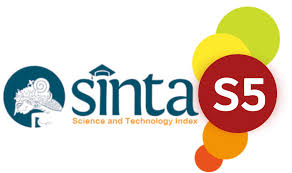PERILAKU INFORMASI DAN PREFERENSI UNIVERSITAS PADA GENERASI MILENIAL
DOI:
https://doi.org/10.35446/dayasaing.v4i3.276Keywords:
Keywords: Consumer’s role, information search behavior, preferenceAbstract
Digital era has shifted the role and information search behavior of selecting university. This study aims to map the role of influencer and decision maker and so as to analyze millennial student’s information search behavior for private universities. Respondent consists of 200 new students in seven private universities located in Riau Province, Indonesia. Data analyzed by using descriptive and chi-square for non-parametric statistic. Study reveals that millennial students autonomously become either prime influencer or decision maker in selecting campus destination. The main information source for millennial students are digital platforms and their peer community. There is no significant relationship between student's background and role of influencer. Meanwhile, student’s area of origin and their working status have a significant relationship with the role of final decision making. On the contrary, parents’ domicile, previous high school, and choice of study department have no significant relationship with the role of final decision making. The most important information for private university applicants are the availability and completeness of campus facilities, detail of tuition fee, and information of scholarship opportunities.
References
Black, J.A., Y.S. Smith, dan J.K. Keels. (2014). The Millenial Generation and Personal Accountability: Spiritual and Classroom Implication. CBAR Spring, diakses dari https://www.researchgate.net/publication/273774095, 31-43
Ezumah, B.A. (2013). College Students’ Use of Social Media: Site Preferences, Uses and Gratifications Theory Revisited. International Journal of Business and Social Sciences, 4(5), 27-34
Hendriani, Lis. (2016). Potret Konsumen Indonesia Terkini. Majalah MIX, edisi 05/XIII/23 Mei – 17 Juni 2016
Imasari, K. Dan Cen Lu. (2010). Pengaruh Media Periklanan Terhadap Pengambilan Keputusan Siswa SMU Untuk Mendaftar di Universitas Kristen Maranatha: Sikap Konsumen Sebagai Variabel Moderasi (Studi Kasus Siswa SMU di Bandung). Jurnal Bisnis dan Ekonomi, 17(2), 109-120
Jha, Mridanish. (2013). Brand Awareness and Consumer Preference With Reference to FMCG Sector in Rural Bihar. International Journal of Advanced Research in Management and Social Sciences, 2(11), 75-85
Jones, C. Dan B. Shao. (2011). The Net Generation and Digital Natives Implication for Higher Education. Open Research Online from www.oro.open.ac.uk
Kotler, P. dan K. Keller. (2007). Manajemen Pemasaran, Jakarta: Indeks
Machfoedz, Mahmud. (2010). Komunikasi Pemasaran Modern. Jogjakarta: Cakra Ilmu
Mardelina, E., dan A. Muhson. (2013). Mahasiswa Bekerja dan Dampaknya Pada Aktivitas Belajar dan Prestasi Akademik. Jurnal Economia, 13(2), 201-209
Mulyati, Y., Mailinarti dan Masruri. (2016). Analisis Faktor-Faktor Yang Mempengaruhi Keputusan Mahasiswa Dalam Memilih Perguruan Tinggi Swasta di Kota Padang. Jurnal Ekonomi dan Bisnis Dharma Andalas, 18(1), 201-228
Nasution, S., dan L. Tarigan. (2013). Pengaruh Sosial Ekonomi Orang Tua Terhadap Minat Anak Melanjutkan Pendidikan Ke Perguruan Tinggi. Jurnal Citizenship, 0(0), 35-52
Nurrohmatullah, M.A. (2016). Hubungan Orientasi Masa Depan dan Dukungan Orang Tua Dengan Minat Melanjutkan Studi Ke Perguruan Tinggi (Siswa-Siswi SMK Negeri 1 Samarinda Kelas XII). e-Journal Psikologi, 4(4), 446-456
Proboyo, A. Dan R. Soedarsono. (2015). Influential Factors in Choosing Higher Education Institution: A Case Study of a Private University in Surabaya. Jurnal Manajemen Pemasaran, 9(1), 1-7
Risan, V., dan Linda. (2017). Orientasi Masa Depan Domain Higher Education Dengan Keterlibatan Siswa Terhadap Siswa/I Kelas X dan XII SMA. Prosiding Temu Ilmiah X Ikatan Psikologi Perkembangan Indonesia, 22-24 Agustus 2017, Semarang, hal. 79-88. ISBN: 978-602-1145-49-4
Rout, D., C. Moharana, D. Sarangi dan A.K. Jain. (2013). An Empirical Study of Student Preference and the Dynamics of Marketing Strategies of Professional Institutes in Odisha. Asian Journal of Business and Economics, 3(3), 3 Quarter III, 1-13
Sanchez, J.S. (2012). Factors Influencing a Student’s Decision to Pursue a Communications Degree in Spain. Intangible Capital, 8(1), 43-60
Sudjana, I. dan A. Wirjono. (2016). 10 Karakter Generasi Milenials. Majalah MIX edisi 23 Mei – 17 Juni 2016
Suryani, W., dan P. Ginting. (2013). Faktor-Faktor Yang Mempengaruhi Keputusan Mahasiswa Memilih Fakultas Ekonomi Universitas Islam Sumatera Utara Al Munawaroh Medan. Jurnal Modernisasi, 9(1), 33-48
Wibowo, A.J.I. dan Y.E Widodo. (2013). Identifikasi Penentu Intensi Studi Ke Perguruan Tinggi: Studi Kasus Terhadap Universitas Swasta Katolik di Indonesia. Jurnal Manajemen, 13(1), 55-72
Williams, K.C. dan R.A. Page. (2011). Marketing to the Generations. Journal of Behavioral Studies in Business, vol. 3. Diakses dari http://www.aabri.com










